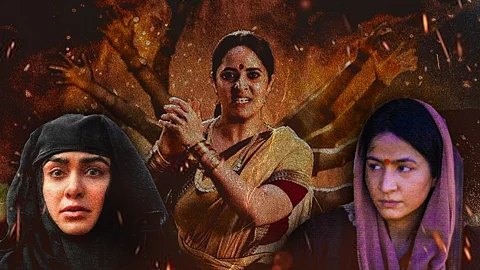

In Vivek Agnihotri’s The Kashmir Files (2022), the real-life sexual assault and gruesome murder of Girija Tickoo, a Kashmiri Pandit woman, features towards the end of the film. She’s stripped and cut into two with a mechanical saw by Muslim militants, and the scene is portrayed in graphic detail. Made on a budget of about Rs 20 crore, The Kashmir Files stormed the box office and raked in close to Rs 350 crore. It was released on the same day as Prabhas’s period romantic drama Radhe Shyam (2022), but despite a slow start and without any major stars in the cast, it became a runaway success.
The Hindu right-wing, including Prime Minister Narendra Modi, endorsed the film and celebrated it for presenting a narrative that they claimed was the truth. At the same time, they did not condemn the calls for violence against Muslims that echoed across cinema halls in the country. The Kashmiri Pandit community was divided over how the film represented their story – while many, including Girija Tickoo’s relatives, applauded Agnihotri for not “whitewashing” their history, others felt it was a dangerously provocative film that exaggerated facts and appropriated their history to fulfil a political agenda.
The unexpected success of The Kashmir Files and the support it received from the ruling establishment created a new canvas for filmmakers who wished to cash in on the Hindu right wing’s propaganda machinery – the bodies of women. These films are different from period dramas that celebrate Hindu icons fighting against Muslim invaders or the British such as Manikarnika: The Queen of Jhansi (2019), Tanhaji: The Unsung Warrior (2020), Samrat Prithviraj (2022), Swatantra Veer Savarkar (2024) or modern dramas that are focused on national pride (post-2014) such as Uri: The Surgical Strike (2019) or Mission Mangal (2019).
In these films, Hindu women are simultaneously the hero and the victim. They are stripped, molested, raped, and humiliated on screen but they are also invested with “nari shakti” to fight back. In Sudipto Sen’s blockbuster film The Kerala Story (2023), for instance, a crucial scene has a group of Hindu and Christian women being sexually assaulted by Muslim men at a mall. The attack is orchestrated as part of a larger conspiracy to make them wear the hijab and adopt an Islamic way of life. Victim-blaming dialogues are thrown at the women. They defend themselves, but their clothes are torn in public and they’re humiliated. Eventually, however, they figure out the conspiracy hatched by the Muslims and fight back.
So, on the one hand, the narrative plays into patriarchal ideas about women and honour where their bodies belong to the community and are to be protected. An assault is an insult to the community. On the other hand, their retaliation is packaged as “women’s empowerment” or a brand of “nationalist” feminism.
To read the full story written by Sowmya Rajendran, sign up for our gender newsletter- The Next Wave. It's a free sign up.